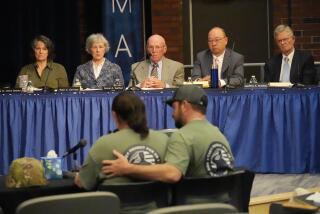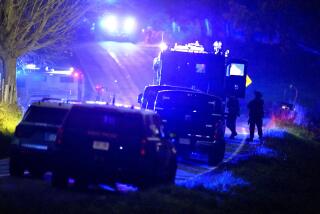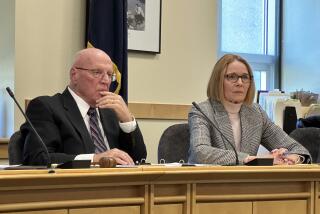Lawmakers Seek 3rd Probe of 1982 Deaths
- Share via
CONCORD, N.H. — Fifteen years ago, the wife and son of a former state trooper were found dead in a burning car.
Despite what police thought at first, it was no accident.
Ultimately, investigators concluded that the victims were either dead or incapacitated before the wreck and that the crash was staged.
But the state closed its second investigation into the case last fall, saying there wasn’t enough evidence to prosecute. Now lawmakers are pressing for a special committee to look into whether there was a cover-up to protect the former trooper, Richard Dow, or his onetime commander.
“There is no statute of limitations on a yearning for justice,” said state Rep. Renny Cushing, sponsor of a bill to launch the committee investigation. “People still grieve.”
The charred bodies of Janet Dow, 40, and her son, Steven, 18, were found in Thornton, a small town about 40 miles north of Concord, on a frigid morning in December 1982.
State police concluded that the deaths were accidental, relying mostly on information from Dow, who was working as a part-time officer in Thornton. Dow said he was home when his wife and adopted son drove off that morning.
There were no autopsies, the state fire marshal wasn’t called and the car, released to Dow soon after the deaths, was quickly destroyed. Officers didn’t note or follow up conflicts between the evidence and Dow’s account.
Based on what Dow said, police concluded that the victims burned to death when their car careened off the road near their home and exploded into flames, supposedly from a bucket of gasoline that Steven had in the car because it held a carburetor he was taking to have repaired.
The troopers also concluded that the victims could not escape because both were hit by bricks that, again according to Dow, had been placed in the car to add weight and improve traction.
The case remained closed until 1993, when Dow’s girlfriend, Karen Saffian, said Dow had told her that he killed his son with an ax after the teenager murdered his mother. Dow staged the accident, Saffian said.
Saffian believes that Dow killed them both and that police might have looked the other way. The original 1982 investigation was conducted by the state police troop where Dow had worked, and Saffian said she believes that the commander, Richard Tuck, steered investigators away from Dow, fearing that Dow would divulge that Tuck fixed tickets.
Tuck called the suggestion “a complete lie.”
Police have said Dow, 53, lives in another New England state but will not say which one. He has an unlisted telephone number and has not returned messages left with his father.
Saffian said she believes that the second investigation was ended to avoid embarrassing the state police. State police and prosecutors concede that mistakes were made in 1982 but assert that officers saw no signs of a crime.
Based on photos of the original crash and two reenactments, the second investigation found that rather than speeding off the road, the car essentially was tipped into the ditch, then set afire.
Ronald Pennington, a former police officer in Woonsocket, R.I., who helped solve a murder there that involved a police cover-up, said prosecutors have more than enough evidence to file charges based on the second investigation, which was led by state police Sgt. Benjamin Mozrall.
“When you look at that first investigation, it was just awful,” Pennington said. “But when you see what an exemplary job [Mozrall] did, why hasn’t something happened here? What’s the problem?”
Mozrall, who retired last fall, referred questions to Assistant Atty. Gen. Mark Zuckerman, who said there is not enough evidence to prosecute.
“Even though reasonable folks could agree there may be probable cause to charge somebody, there certainly is not sufficient proof to obtain a conviction beyond a reasonable doubt, and it would not be proper for me to go forward as a prosecutor on evidence I know to be deficient,” he said last fall.
Cushing acknowledged that his bill is unlikely to lead to criminal charges, but said he wants to find the truth anyway.
“I would like to see, ultimately, the committee come to conclusions about whether or not Dow did kill his wife--review the evidence, so at least the public knows,” the lawmaker said.
More to Read
Sign up for Essential California
The most important California stories and recommendations in your inbox every morning.
You may occasionally receive promotional content from the Los Angeles Times.










